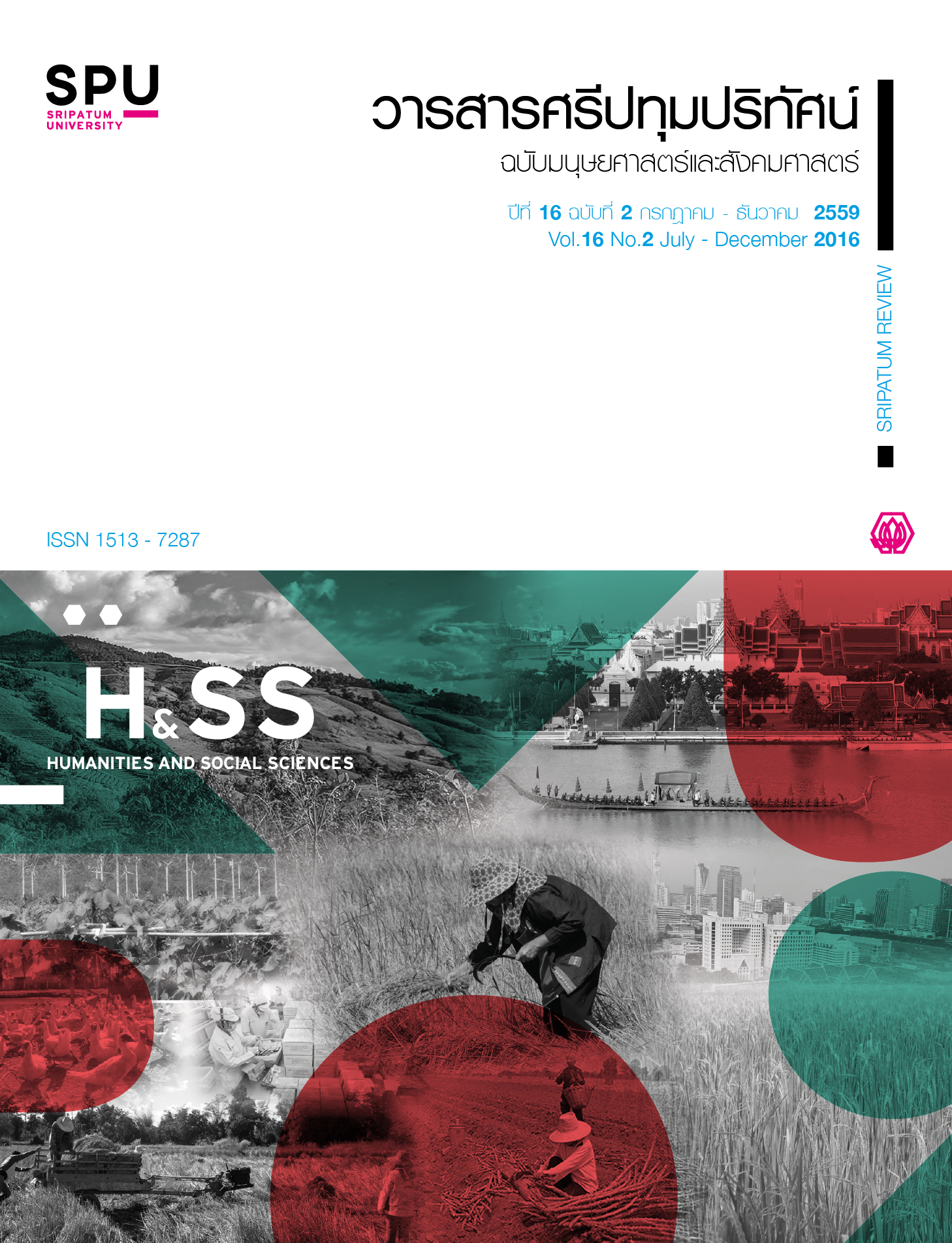A COMPETENCY DEVELOPMENT MODEL FOR CAREGIVERS OF THE ELDERLY
Main Article Content
Abstract
This research study aims to (1) examine a competency model of caregiver of the elderly; (2) investigate the current level of needs for competency of caregiver of the elderly; and (3) develop a competency model for caregivers of the elderly. This study employed the mixed-method research involving the quantitative and qualitative research methods. The research process comprised three stages. The first stage was the examination of competencies of caregiver of the elderly by reviewing related literature and conducting in-depth interviews of a group of caregivers of the elderly. The second stage was the investigation of the current level of and the needs for competencies of caregiver of the elderly and the study of a competency development model for caregivers of the elderly with the use of a questionnaire. The third stage was the evaluation of the competency development model for caregivers of the elderly by organizing a focus group discussion involving six experts to evaluate the appropriateness of the competency development model.
The research findings were as follows:
1. The examined competency model of caregiver of the elderly was composed of three components: The first component was the core competency component of caregiver of the elderly comprising 1.1 service-mindedness, 1.2 morality and ethics, 1.3 technical knowledge, 1.4 fair achievement motivation, 1.5 communications, 1.6 team working, and 1.7 creative thinking. The second component was the functional competency comprising 2.1 good attitude toward the elderly, 2.2 emotion and personality control, 2.3 health and safety promotion, 2.4 medical equipment maintenance, 2.5 work responsibility, and 2.6 ability to handle blood and body discharge. The third component was the managerial competency comprising 3.1 problem solving and decision making, 3.2 leadership, and 3.3 managerial ability.
2. The overall current competency of caregivers of the elderly was rated at the moderate level; while the needs for competency of caregivers of the elderly were at the high level.
3. The competency development model for caregivers of the elderly was created by taking the results of gaps evaluation of competency levels to formulate the individual development plan (IDP) to reduce the gaps and to formulate training plans in accordance with competency components. The competencies to be developed were the following: 1. The functional competency comprising 1.1 methods and techniques for handling blood and body discharge, 1.2 techniques for medical equipment maintenance, 1.3 functions and responsibility in caregiving to the elderly, 1.4 health and safety promotion for the elderly, and 1.5 emotion control and personality development for caregivers of the elderly, respectively. 2. The managerial competency comprising 2.1 leadership techniques and techniques for solving emergency problems, and 2.2 managerial techniques for caregiving to the elderly, respectively. 3. The core competency comprising 3.1 the creation of work teams and creativity in caregiving to the elderly, 3.2 technical knowledge concerning caregiving to the elderly, 3.3 techniques for fair achievement-oriented working and 3.4 techniques for communications in caregiving to the elderly, respectively.
Article Details
1. กองบรรณาธิการสงวนสิทธิ์ในการพิจารณาและตัดสินการตีพิมพ์บทความในวารสาร
2. บทความทุกเรื่องจะได้รับการตรวจสอบทางวิชาการโดยผู้ทรงคุณวุฒิ แต่ข้อความและเนื้อหาในบทความที่ตีพิมพ์เป็นความรับผิดชอบของผู้เขียนแต่เพียงผู้เดียว มิใช่ความคิดเห็นและความรับผิดชอบของมหาวิทยาลัยศรีปทุม
3. การคัดลอกอ้างอิงต้องดำเนินการตามการปฏิบัติในหมู่นักวิชาการโดยทั่วไป และสอดคล้องกับกฎหมายที่เกี่ยวข้อง
References
กรมอนามัย. 2556. คู่มือการดูแลสุขภาพผู้สูงอายุระยะยาว. กรุงเทพมหานคร: สำนักส่งเสริมสุขภาพ กระทรวงสาธารณสุข ประเทศไทย.
ณรงค์วิทย์ แสนทอง. 2550. Competency เพื่อการประเมินผลงานประจำปี. กรุงเทพมหานคร: เอชอาร์ เซ็นเตอร์.
ปริญญา แร่ทอง. 2547. “ประสบการณ์การอยู่ร่วมกันระหว่างผู้สูงอายุครอบครัวผู้สูงอายุ และผู้ดูแลที่ได้รับการว่าจ้างในการดูแลผู้สูงอายุที่อยู่ในภาวะพึ่งพา.” วิทยานิพนธ์ปริญญามหาบัณฑิตสาขาวิชาพยาบาลศาสตร์ บัณฑิตวิทยาลัย จุฬาลงกรณ์มหาวิทยาลัย.
ปิยะชัย จันทรวงศ์ไพศาล. 2549. การค้นหาและวิเคราะห์เจาะลึก Competency ภาคปฏิบัติ. กรุงเทพมหานคร: เอชอาร์เซ็นเตอร์.
ปิยาภรณ์ จันทร์โพธิ์. 2547. “สัมพันธภาพในการดูแลผู้ป่วยภาวะสมองเสื่อมในบริบทการเปลี่ยนแปลงทางสังคม วิทยาลัย.” วิทยานิพนธ์ปริญญามหาบัณฑิต สาขาวิชาสังคมวิทยาบัณฑิตวิทยาลัย จุฬาลงกรณ์มหาวิทยาลัย.
เพ็ญจันทร์ แสนประสาน และคณะ. 2548. การจัดการทางการพยาบาลสู่การเรียนรู้. กรุงเทพมหานคร: สุขุมวิทการพิมพ์.
มูลนิธิสถาบันวิจัยและพัฒนาผู้สูงอายุไทย.2555. รายงานสถานการณ์ผู้สูงอายุไทย พ.ศ. 2556. กรุงเทพมหานคร: อมรินทร์พริ้นติ้งแอนด์พลับพลิชชิง.
ศิริพันธุ์ สาสัตย์ และเตือนใจ ภักดีพรหม. 2549. การวิจัยระบบการดูแลผู้สูงอายุที่เป็นทางการของไทย, เครือข่ายวิจัยสุขภาพ. กรุงเทพมหานคร: สำนักงานกองทุนสนับสนุนการวิจัย.
ศิริพันธุ์ สาสัตย์, ประนอม รอดคำดี และเตือนใจ ภักดีพรหม. 2550. การวิจัยการพัฒนารูปแบบการประกันคุณภาพผู้ช่วยผู้ดูแลผู้สูงอายุ เครือข่ายวิจัยสุขภาพ. กรุงเทพมหานคร: สำนักงานกองทุนสนับสนุนการวิจัย.
สำนักงานปลัดกระทรวงการพัฒนาสังคมและ ความมั่นคงของมนุษย์. 2556.สถานการณ์ประชากรสูงอายุไทยปี 2554. กรุงเทพมหานคร: สำนักงานปลัดกระทรวงการพัฒนาสังคม และความมั่นคงของมนุษย์.
สำนักงานสถิติแห่งชาติ. 2551. ผู้สูงอายุไทย2550 มุมมอง/ เสียงสะท้อนจากข้อมูลสถิติ. กรุงเทพมหานคร: พี.เอ.ลิฟวิ่ง.
สุกัญญา รัศมีธรรมโชติ. 2550. Competency-Based HRM. กรุงเทพมหานคร: สถาบันเพิ่มผลผลิตแห่งชาติ.
สุวิมล ว่องวาณิช. 2548. การวิจัยประเมินความต้องการจำเป็น. กรุงเทพมหานคร: จุฬาลงกรณ์มหาวิทยาลัย.
Campbell, R. 1984. “Nursing Homes and Long-term Care.” Japan Pacific Affairs, 57, 1: 78-89.
Chanpradit, A. 2003. “Need of Care and Customer Satisfaction from Eldercare Workers in Metropolitan Bangkok.” Master’s Thesis, Adult Nursing, Faculty of Graduate Studies, Mahidol University.
Krejcie, R. V. and Morgan, D. W. 1970. “Determining Sample Size for Research Activities.” Educational and Psychological Measurement, 30: 607-610.
Lassey, W. R. and Lassey, M. L. 2001. Japan: Challenges of Aging and Culture Change in Quality of Life for Older People: An International Perspective. New Jersey: Prentice Hall.
United Nations. 2011. The Age and Sex of Migrants. New York: Department of Economic and Social Affairs Population Division.
Yap et al. 2003. “Who are the Residents of a Nursing Home in Singapore.” Singapore Medical Journal, 44, 2: 65-73.


